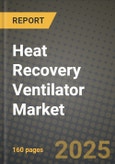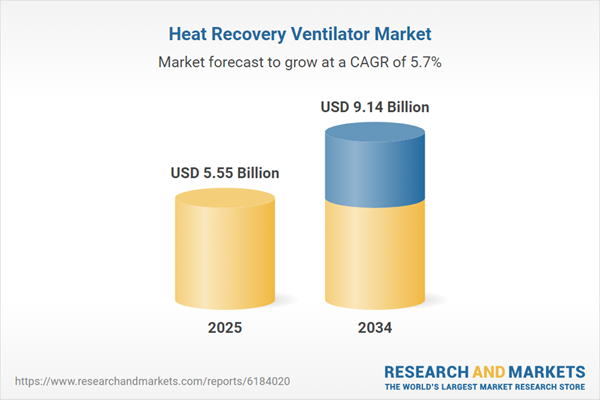Heat Recovery Ventilator Market
Heat Recovery Ventilators (HRVs) provide balanced, mechanical ventilation that exchanges stale indoor air with fresh outdoor air while recovering a significant portion of sensible heat through air-to-air heat exchangers. As building owners pursue energy efficiency, indoor air quality, and decarbonization simultaneously, HRVs have moved from optional add-ons to core HVAC components in new construction and deep retrofits. Top applications include single-family and multifamily residences, schools and universities, healthcare and laboratories, offices and retail, hospitality, and high-spec industrial and clean production spaces. Recent trends emphasize compact, high-efficiency counterflow cores; electronically commutated (EC) fans; demand-controlled operation using IAQ sensors; quiet acoustics for residential and classroom installations; and smart controls with remote monitoring and fault diagnostics. Market drivers include stricter energy codes and ventilation standards, the post-pandemic focus on healthful buildings, electrification and heat-pump adoption that make airtight envelopes standard, and utility/green-building incentives. The competitive landscape spans global HVAC majors, regional specialists, and component suppliers for cores, motors, and filtration; differentiation is shifting toward verified efficiency at real-world static pressures, ease of commissioning, installation accessories for space-constrained retrofits, and low lifecycle cost via filter access and serviceability. Strategic themes include hybrid HRV/ERV portfolios for varying humidity loads, packaged rooftop and decentralized room units for phased renovation, BIM-friendly configuration, and performance transparency through standardized testing and connected telemetry. As portfolios become software-defined, suppliers that pair robust hardware with analytics, commissioning tools, and contractor enablement are best positioned to win specification and replacement cycles across climate zones.Heat Recovery Ventilator Market Key Insights
- Codes, health, and decarbonization converge. Tight envelopes from energy codes and heat-pump retrofits increase the need for balanced ventilation; HRVs help meet IAQ targets without penalizing heating loads. Owners value solutions that simultaneously satisfy ventilation rates, emissions goals, and occupant comfort, reducing the trade-offs that historically slowed adoption.
- From nameplate to installed performance. Specifiers increasingly evaluate efficiency at realistic external static pressures with filters loading over time. Products that maintain airflow and recovery effectiveness under duct complexity, long runs, and multi-branch layouts are favored, shifting competition from lab highlights to verifiable field performance.
- Demand-controlled ventilation becomes standard. Embedded CO₂, VOC, and humidity sensing enables variable airflow and scheduling aligned to occupancy. This reduces fan energy, filter wear, and noise, while maintaining target IAQ - especially valuable for schools, offices, and multifamily corridors with variable usage patterns.
- Quiet operation is a procurement gate. Acoustic performance at the occupied zone is a decisive factor for bedrooms, classrooms, and clinics. Low-turbulence internal geometry, vibration isolation, and thoughtful grille design differentiate suppliers by reducing installation compromises and call-backs.
- Retrofit-ready form factors unlock volume. Slim, modular, and decentralized HRVs (in-ceiling cassettes, through-wall units, and multi-port small-duct systems) address space constraints in existing buildings. Tool-less filter access, reversible connections, and integrated condensate management simplify installation and service.
- Controls and connectivity are the moat. Commissioning wizards, airflow self-balancing, BACnet/Modbus integration, and cloud dashboards reduce start-up time and support performance verification. Remote alerts for filter replacement, frost protection events, and fan faults underpin service contracts and lower total cost of ownership.
- HRV/ERV portfolio strategy by climate. In dry and cold climates, HRVs optimize sensible recovery and frost-safe operation; in mixed/humid zones, ERVs with enthalpy transfer limit indoor humidity swings. Vendors winning specifications offer both, with guidance tools that map climate and use-case to the right core.
- Supply chain and component choices matter. Availability of EC motors, polymer and aluminum cores, and high-capacity filters impacts lead times and reliability. Vendors with multi-region manufacturing, common platforms, and interchangeable components better absorb volatility and support global programs.
- Evidence-based IAQ drives funding. Education and healthcare buyers prioritize sensor data, trend logs, and third-party verification to justify upgrades. Transparent reporting tied to wellness and sustainability frameworks improves approval odds for grants, incentives, and ESG-linked capital.
- Service models create stickiness. Bundled maintenance, filter logistics, and periodic commissioning audits increase uptime and protect savings assumptions. Contractors equipped with digital twins and QR-coded assets resolve issues faster, raising owner satisfaction and lifetime customer value.
Heat Recovery Ventilator Market Reginal Analysis
North America
Adoption is buoyed by stricter energy codes, electrification incentives, and IAQ programs in schools and public buildings. Interest centers on cold-climate HRVs with reliable frost control, high MERV filtration compatibility, and quiet operation for residential retrofits. Commercial buyers prioritize BACnet/Modbus integration with building automation and documented installed performance. Distribution partnerships and contractor training influence brand selection and project throughput.Europe
Longstanding efficiency regulations and airtight construction create a mature market, with demand split between centralized systems in multifamily and decentralized room units for renovations. Specifiers emphasize verified efficiency, acoustic comfort, and ease of balancing in compact dwellings. Integration with heat pumps and low-temperature hydronics is common, while digital commissioning and continuous IAQ reporting support green-building certifications and municipal funding.Asia-Pacific
Rapid urbanization and premium multifamily projects drive ventilation upgrades alongside evolving IAQ expectations. In mixed and humid climates, portfolios often pivot to ERV options while retaining HRVs for temperate and cool regions. Builders seek compact cassettes for high-rise cores, robust filters for pollution mitigation, and smart controls aligned to local super-app ecosystems. Local manufacturing and channel partners are pivotal for scale.Middle East & Africa
Hot, often dusty climates prioritize robust filtration, corrosion-resistant materials, and easy maintenance. While ERVs dominate humidity control, HRVs serve cooled, low-humidity interiors and non-humid regions. Hospitality, healthcare, airports, and education projects lead demand, with owners valuing connected monitoring for compliance and energy management within district cooling and smart-city frameworks.South & Central America
Interest rises with healthier building initiatives in major metros and hospitality/tourism renovations. Projects favor retrofit-friendly HRVs and decentralized units that minimize ductwork. Buyers evaluate lifecycle cost, local service capability, and filter availability as strongly as efficiency. Public programs targeting schools and clinics create anchor volumes, with distributors and trained installers determining brand momentum.Heat Recovery Ventilator Market Segmentation
By Ventilation Rate
- Up to 100 CFM
- 100 to 150 CFM
- 150 to 200 CFM
- Above 200 CFM
By Type
- Vertical
- Horizontal
By Application
- Commercial
- Residential
- Industrial
By Deployment
- New Installation
- Replacement
By Capacity
- Wall Mounted
- Celling Mounted
- Cabinet
By Distribution Channel
- Online
- Retail Stores
- Wholesale Stores
- Others
Key Market players
Zehnder Group, Systemair, Swegon, Aldes, Broan-NuTone (Venmar), Panasonic, Mitsubishi Electric, Daikin, Carrier, Trane Technologies, Lennox International, Greenheck, Vent-Axia (Volution Group), Nuaire (Genuit Group), Vortice, Brink Climate Systems, Komfovent, Vallox, Blauberg Ventilatoren, RenewAireHeat Recovery Ventilator Market Analytics
The report employs rigorous tools, including Porter’s Five Forces, value chain mapping, and scenario-based modelling, to assess supply-demand dynamics. Cross-sector influences from parent, derived, and substitute markets are evaluated to identify risks and opportunities. Trade and pricing analytics provide an up-to-date view of international flows, including leading exporters, importers, and regional price trends.Macroeconomic indicators, policy frameworks such as carbon pricing and energy security strategies, and evolving consumer behaviour are considered in forecasting scenarios. Recent deal flows, partnerships, and technology innovations are incorporated to assess their impact on future market performance.
Heat Recovery Ventilator Market Competitive Intelligence
The competitive landscape is mapped through proprietary frameworks, profiling leading companies with details on business models, product portfolios, financial performance, and strategic initiatives. Key developments such as mergers & acquisitions, technology collaborations, investment inflows, and regional expansions are analyzed for their competitive impact. The report also identifies emerging players and innovative startups contributing to market disruption.Regional insights highlight the most promising investment destinations, regulatory landscapes, and evolving partnerships across energy and industrial corridors.
Countries Covered
- North America - Heat Recovery Ventilator market data and outlook to 2034
- United States
- Canada
- Mexico
- Europe - Heat Recovery Ventilator market data and outlook to 2034
- Germany
- United Kingdom
- France
- Italy
- Spain
- BeNeLux
- Russia
- Sweden
- Asia-Pacific - Heat Recovery Ventilator market data and outlook to 2034
- China
- Japan
- India
- South Korea
- Australia
- Indonesia
- Malaysia
- Vietnam
- Middle East and Africa - Heat Recovery Ventilator market data and outlook to 2034
- Saudi Arabia
- South Africa
- Iran
- UAE
- Egypt
- South and Central America - Heat Recovery Ventilator market data and outlook to 2034
- Brazil
- Argentina
- Chile
- Peru
Research Methodology
This study combines primary inputs from industry experts across the Heat Recovery Ventilator value chain with secondary data from associations, government publications, trade databases, and company disclosures. Proprietary modeling techniques, including data triangulation, statistical correlation, and scenario planning, are applied to deliver reliable market sizing and forecasting.Key Questions Addressed
- What is the current and forecast market size of the Heat Recovery Ventilator industry at global, regional, and country levels?
- Which types, applications, and technologies present the highest growth potential?
- How are supply chains adapting to geopolitical and economic shocks?
- What role do policy frameworks, trade flows, and sustainability targets play in shaping demand?
- Who are the leading players, and how are their strategies evolving in the face of global uncertainty?
- Which regional “hotspots” and customer segments will outpace the market, and what go-to-market and partnership models best support entry and expansion?
- Where are the most investable opportunities - across technology roadmaps, sustainability-linked innovation, and M&A - and what is the best segment to invest over the next 3-5 years?
Your Key Takeaways from the Heat Recovery Ventilator Market Report
- Global Heat Recovery Ventilator market size and growth projections (CAGR), 2024-2034
- Impact of Russia-Ukraine, Israel-Palestine, and Hamas conflicts on Heat Recovery Ventilator trade, costs, and supply chains
- Heat Recovery Ventilator market size, share, and outlook across 5 regions and 27 countries, 2023-2034
- Heat Recovery Ventilator market size, CAGR, and market share of key products, applications, and end-user verticals, 2023-2034
- Short- and long-term Heat Recovery Ventilator market trends, drivers, restraints, and opportunities
- Porter’s Five Forces analysis, technological developments, and Heat Recovery Ventilator supply chain analysis
- Heat Recovery Ventilator trade analysis, Heat Recovery Ventilator market price analysis, and Heat Recovery Ventilator supply/demand dynamics
- Profiles of 5 leading companies - overview, key strategies, financials, and products
- Latest Heat Recovery Ventilator market news and developments
Additional Support
With the purchase of this report, you will receive:- An updated PDF report and an MS Excel data workbook containing all market tables and figures for easy analysis.
- 7-day post-sale analyst support for clarifications and in-scope supplementary data, ensuring the deliverable aligns precisely with your requirements.
- Complimentary report update to incorporate the latest available data and the impact of recent market developments.
This product will be delivered within 1-3 business days.
Table of Contents
Companies Mentioned
- Zehnder Group
- Systemair
- Swegon
- Aldes
- Broan-NuTone (Venmar)
- Panasonic
- Mitsubishi Electric
- Daikin
- Carrier
- Trane Technologies
- Lennox International
- Greenheck
- Vent-Axia (Volution Group)
- Nuaire (Genuit Group)
- Vortice
- Brink Climate Systems
- Komfovent
- Vallox
- Blauberg Ventilatoren
- RenewAire
Table Information
| Report Attribute | Details |
|---|---|
| No. of Pages | 160 |
| Published | November 2025 |
| Forecast Period | 2025 - 2034 |
| Estimated Market Value ( USD | $ 5.55 Billion |
| Forecasted Market Value ( USD | $ 9.14 Billion |
| Compound Annual Growth Rate | 5.7% |
| Regions Covered | Global |
| No. of Companies Mentioned | 20 |









